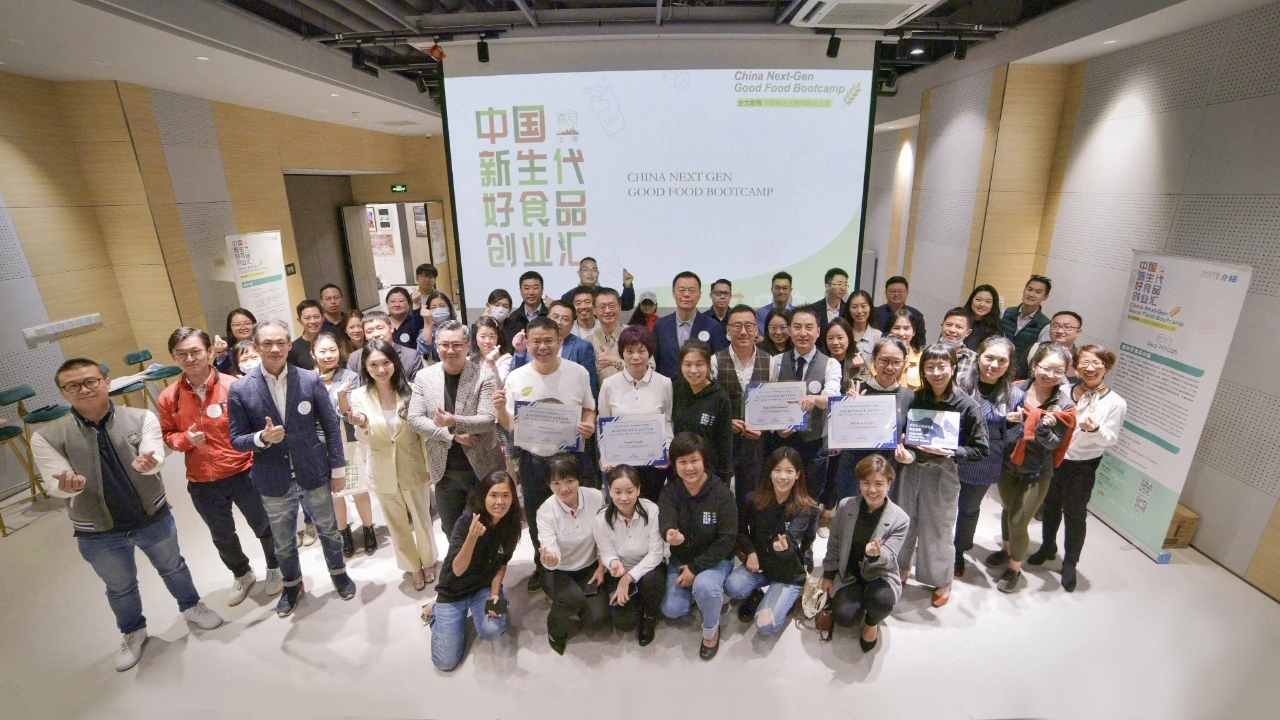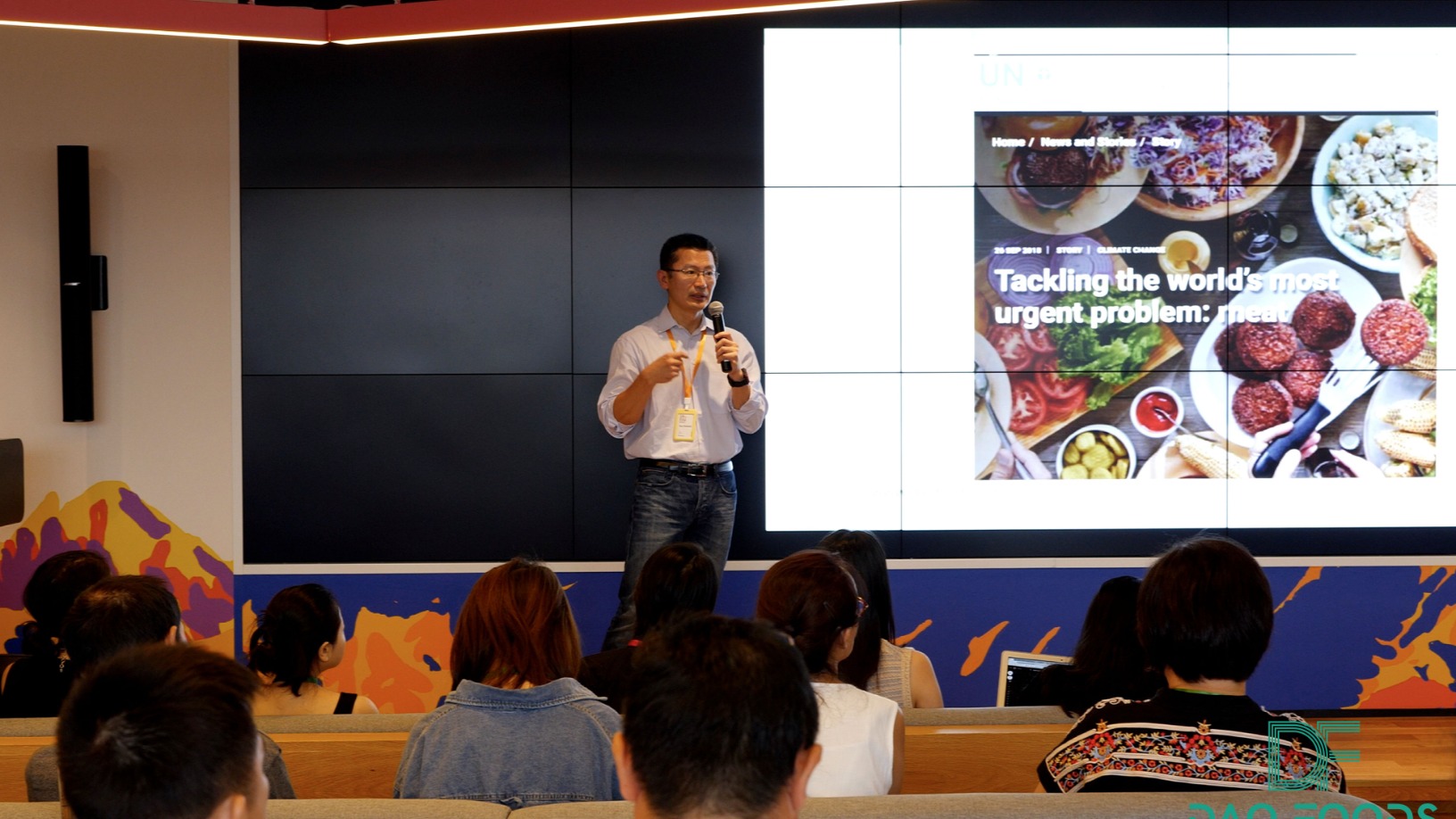Just a few months after Dao Foods International launched in early 2018, the UK F&B retail weekly The Grocer named it one of the 15 players disrupting the global meat industry today. What had impressed the magazine was Dao Foods’s mission to convince the Chinese, the world’s largest consumers of meat, that plant-based proteins would be just as palatable, but without the damage cost to the environment.
Back then, the Chinese market barely knew what meat substitutes were, apart from the traditional vegetarian mock meat associated with Buddhist traditions. Led by pioneering impact investor Zhang Tao, the team at Dao Foods decided they had to start by nurturing startups in the sector, helping them to create and build attractive plant-based alternative protein products. Their target: China’s 400m millennials, a generation more open to trying new foods and experiences. Dao Foods also launched the China Next-Gen Good Food Bootcamps in Beijing and Shanghai, as well as other events, to connect such startups with investors.
After two years of laying the groundwork, Dao Foods recently unveiled the first cohort of local startups accepted into its incubator program. All four of them work on plant-based food or drink, including takeaway delivery service provider Kitchen 70/30, yogurt producer Fresh Foods, organic smoothie maker Raw Plant-Based and WOW Foods, which develops plant-based functional protein drinks for children.
A supporting open-end fund, Dao Foods Venture Fund I, was also launched in September. Its LPs include New Crop Capital, which is also the founding partner of Dao Foods, Matrix Partners China, family offices; as well as private investors, including Wayne Silby, co-founder of Calvert Investments, which manages $15bn worth of assets.
“2020 is the year when the plant-based food trend began gaining traction in China, attracting more players to this field,” Zhang, co-founder of Dao Foods, said in an interview. The buzz around plant-based meat pioneers Beyond Meat and Impossible Foods certainly helped drive that trend. But China, he said “is destined to produce its equivalent, or even grander, versions of Beyond Meat or Impossible Foods.”
Beyond Meat trend
Also this year, Dao Foods, together with New Crop Capital and Matrix Partners China, had invested in plant-based meat alternative startup Starfield in March via an eight-digit-RMB seed funding round. Starfield was a graduand of Dao Foods’s China Next-Gen Good Food Bootcamp in 2019.
The Shenzhen-based company is China’s most funded plant-based meat startup to date, having raised an eight-digit-US dollar Series A funding round in August, and a nine-digit-RMB Series A+ round two months later in October. Starfield also recently joined hands with Chinese fast-food restaurant chain Dicos to offer meatless chicken burgers and nuggets at the latter’s 2,600 restaurants across the country.
China is destined to produce its equivalent, or even grander, versions of Beyond Meat or Impossible Foods
An impact investor and social entrepreneur for over a decade, Zhang noticed obvious shifts in China’s alternative protein market, with Beyond Meat’s spectacular returns for investors providing a tipping point of sorts in the sector. Beyond Meat’s public listing on Nasdaq in May 2019 is one of the most successful IPOs in history, with its shares tripling in value from its initial offer price of $25 apiece by December 2019.
“Before that [Beyond Meat’s IPO], it was hard for us to find interested investors, especially from China,” Zhang said via online call. “After the IPO, lots of domestic investors began setting eyes on plant-based proteins.”
Entrepreneurs have been similarly inspired: Dao Foods received 70 to 80 applications for its incubator program when it launched in April. “When Dao Foods just started, it was nearly impossible to see any startups in the domestic market,” Zhang recalled.
The market remains nascent though. “Entrepreneurs require mentorship and support in many aspects. And this is the exact reason that we launched Dao Foods incubator in the first place," he added.
According to Euromonitor International, China’s alternative meat market is forecast to grow to nearly $12bn by 2023 from under $10bn in 2018, driven by consumer concern over food safety and pork supply shortage due to the African swine flu outbreak, among other factors.
Talent spotting for investors
Dao Foods also serves as a funnel for investors seeking a stake in the Chinese meat alternative market through follow-on investment. “I believe they [investors] can find high-quality investment options through our program,” Zhang said.
Through its incubator program, the Dao Foods fund plans to invest RMB 15m in about 30 companies over the next three years, in return for a minority share, which Zhang declined to comment on. The four startups of the first cohort will each get RMB 500,000 of funding, a quantum that will be adjusted as the program – which will run over six cycles, each lasting half a year – evolves.
Beyond financing, the selected startups will get personalized mentoring from Dao Foods’s global network of experts and industry partners, including Chris Kerr, Chief Investment Officer of New Crop Capital, and Kim Odhner, Managing Partner for Asia and Europe at New Crop Capital.

The one-on-one incubation service will completely depend on entrepreneurs’ specific needs. “We won’t impose pre-made training on them,” Zhang stressed. “If one founder needs advice or help on either distribution channel or branding, we will assign the right mentors for him or her.”
Nearly all Chinese plant-based startups began by partnering with universities for product R&D, and Dao Foods’s incubator program will help these young businesses get essential technical support from its industry partners, including R&D institutions. And Zhang believes the startups will gradually build their own R&D capabilities, going forward.
Dao Foods will help its startups develop products that appeal to the younger generation of Chinese consumers. But it doesn’t mean that consumers of other age groups will be ignored.
“Young people are low-hanging fruit for us since they are more willing to try plant-based products, the so-called next-generation food,” said Zhang, “After they have tried the products, I believe they are likely to recommend them to their parents, who have more ingrained eating habits, thereby shaping the family diet.”
He added that Dao Foods will also consider admitting foreign alternative protein startups whose products or services have the potential to attract mainstream consumers in China, including those working in cultured meat.
Origins in impact investing
For Zhang, incubating meat alternative startups not only helps to prepare entrepreneurs for the promising market in China, it also enables consumers in the country to indirectly do their part for environmental sustainability – even if they don’t personally care much about the issue. It’s a philosophy he has developed from over a decade spent in environment-focused impact investing.
Zhang had first learnt about impact investing during his postgraduate studies at the Harvard Kennedy School of public administration around 2009. After graduation, he led New Ventures, an impact accelerator of the World Resources Institute in Washington that supported environmental small and medium-sized enterprises (SMEs) in six developing countries, including China. He also co-founded China Impact Fund, China’s first impact investing vehicle for environmental SMEs, around 2012, and later Dao Ventures for cross-border impact investing.
Young people are low-hanging fruit for us since they are more willing to try plant-based products
At Harvard, Zhang often wondered how mainstream consumers in China, the world’s most populated country, could become part of the solution to environmental issues. “Although environmental-focused SMEs are creating meaningful impact within their respective sectors, that impact is not necessarily going beyond their domains to reach the vast Chinese consumer market,” he reasoned.
In 2017, a chance meeting with Albert Tseng, a classmate from Harvard and founder of Moonspire Social Ventures, and Bruce Friedrich, co-founder of Good Food Institute, a US-based nonprofit organization promoting plant-based products and cultured meat, inspired Zhang, leading him to the realm of plant-based proteins. After a year of feasibility studies and talking to various stakeholders in China, Zhang and Tseng launched Dao Foods in February 2018 as a collaboration between Dao Ventures, Moonspire Social Ventures and New Crop Capital.
“We chose to do it in the way that we are good at,” Zhang said. Dao Foods and its similarly pronounced Chinese name, Daofuzi, reflect the teachings of The Analects by Confucius, about respecting nature and its laws, and the practice of benevolence toward its elements, including animals. Such is “the way,” or “dao,” a fundamental concept in Chinese and Confucian philosophy, for the impact investor.
Beyond incubating and investing in plant-based protein startups, Dao Foods is also looking at upstream businesses for investment opportunities, since soy and pea beans are currently the main ingredients of plant-based protein products in China and their provision is dependent on imports, which poses a challenge to bringing down the cost of plant-based meat alternatives.
”We also expect to see some creative businesses that will use other ingredients to create flavors favored by Chinese consumers," Zhang added.
Products come first
For now, though, “entrepreneurs shouldn’t spend too much time thinking about issues like cost, product accessibility and branding, not until they have created their product market fit,” Zhang cautioned. He stressed more than once that plant-based protein businesses should prioritize creating quality products that are tasty and can fit seamlessly into consumers’ spontaneous and continued shopping habits.
In the US, organizations working on sustainability and animal welfare, including NGOs, have been educating the consumers there for decades. "So when plant-based products became available, consumers there soon opted for the substitutes” for those reasons.
But in China, “even if consumers fully understand the benefits of plant-based protein, it’s still hard to change their diets without giving them satisfying alternatives [to meat],” he said. Furthermore, when sustainability and animal welfare don’t feature highly among the priorities of mainstream consumers, getting the flavor, accessibility and pricing right is even more crucial for success.
I hope domestic entrepreneurs are patient enough, and not rush to market with something they have borrowed from others
But in that alone, the startups face their biggest hurdle: China’s plant-based protein market is still in its infancy, and most entrepreneurs still don’t know how to make their product appealing to consumers. The problem is not unique to China though. Even pioneers Beyond Meat and Impossible Foods spent the bulk of their early years and funding on designing, refining and perfecting their products.
This partly explains the importance that Dao Foods attaches to R&D, which is the key to better products. While selecting startups for its incubator, Dao Foods ranks technological know-how as a preferred criteria. Zhang also recommended that startups in the space focus their resources, including funding, on R&D so as to continually improve their offerings.
“I hope domestic entrepreneurs are patient enough, and not rush to market with something they have borrowed from others in the guise of new packages or flavors,” Zhang said. “Such startups are definitely what we’d want to avoid.”
This also explains Starfield’s lure for Dao Foods. “Their passion for product is what we value most,” he said.
Vast market, quick to adapt
Foreign players and established Chinese F&B brands, including Wahaha and Jinzi Ham, have also begun rolling out plant-based products in the market. But Zhang thinks startups have no reason to back down, as China presents a market large enough for the different players to coexist.
For the incumbents, plant-based protein accounts for only a tiny slice of their product range, so it will be harder for them to build brand awareness compared with a plant-based protein heavyweight.
“When we talk about plant-based meat, the first name that comes to our mind is Beyond Meat or Impossible Foods, instead of Nestlé or other traditional food giants that already entered in the space,” he noted. Despite their deeper war chests, these multinationals also face great internal competition for resources. This might give an edge to startups, which can afford to be more focused and committed.
The Chinese government could play an important role in the market, too, although no specific policies for plant-based protein have yet been set, said Zhang. “We hope the government will focus the attention on entrepreneurs and give them some incentives, such as tax preferences and rewards for tech innovations, which will help attract more players and drive product R&D in the field.”
Currently, some industry organizations are working in that direction, in the hope of prompting the government to first delineate clear definitions for plant-based proteins, and then draft national standards for the sector. “But it might take some time," Zhang conceded. “Right now, all the activities in the sector are driven by the market forces.”
The patient investor that he is, Zhang remains highly optimistic about the outlook of the plant-based alternative protein market.
“We have the American and European markets as references,” he said, “and entrepreneurs, investors and consumers here are very good learners, making wide and quick adoption of the new-generation food in China possible.” China, he believes, will catch up with the Western markets in the next two to three years, if not, three to four years at most.











